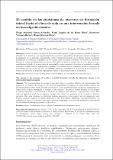Mostrar el registro sencillo del ítem
El cambio en las emociones de maestros en formación inicial hacia el clima de aula en una intervención basada en investigación escolar
| dc.creator | Retana Alvarado, Diego Armando | |
| dc.creator | De las Heras Pérez, María Ángeles | |
| dc.creator | Vázquez Bernal, Bartolomé | |
| dc.creator | Jiménez Pérez, Roque | |
| dc.date.accessioned | 2019-11-14T21:18:59Z | |
| dc.date.available | 2019-11-14T21:18:59Z | |
| dc.date.issued | 2018-04-01 | |
| dc.identifier.citation | https://revistas.uca.es/index.php/eureka/article/view/4057 | |
| dc.identifier.issn | 1697-011X | |
| dc.identifier.uri | https://hdl.handle.net/10669/79853 | |
| dc.description.abstract | El clima de aula es un medio de interacción entre variables cognitivas, afectivas y sociales. Se describe el cambio en las emociones que experimentan futuros maestros hacia el clima de aula; antes, durante y después de la indagación de un problema sociocientífico sobre construcción hotelera en un Parque Natural de España. Participaron 54 estudiantes de Didáctica de las Ciencias de la Naturaleza I del Grado de Maestro en Educación Primaria de la Universidad de Huelva en el curso 2016-2017. Se aplicó un cuestionario de escala Likert en el que manifestaron su grado de acuerdo sobre la intensidad de catorce emociones. Los datos se sometieron a análisis descriptivo, análisis factorial exploratorio y pruebas no paramétricas. Las emociones positivas alcanzaron las intensidades más altas en las tres fases. Se establecen diferencias significativas en la mayoría de las emociones en función del momento. Se proponen implicaciones para la formación emocional de los maestros. | es_ES |
| dc.description.abstract | The change in the emotions of teachers in initial formation towards the classroom climate in an intervention based on inquiry The classroom climate is a means of interaction between cognitive, affective and social variables. The purpose is to describe the change in the emotions experienced by teachers in initial training towards the classroom climate; before, during and after an inquiry of a socio-scientific problem about hotel construction in a Natural Park of Spain. Participated 54 students of the subject of Didactics of Nature Sciences I of the Degree in Primary Education of the University of Huelva in the academic year 2016-2017. A questionnaire of the Likert scale was applied in which the participants expressed their degree of agreement on the intensity of fourteen emotions. Data were subjected to descriptive analysis, exploratory factor analysis and non-parametric tests. Positive emotions reached the highest intensities in the three phases. Significant statistical differences are established in most of the positive and negative emotions depending on the moment. Implications are proposed for the emotional training of primary school teachers. | es_ES |
| dc.language.iso | es | es_ES |
| dc.source | Revista Eureka sobre Enseñanza y Divulgación de las Ciencias, vol.15(2), pp. 2602-2618 | es_ES |
| dc.subject | Emociones | es_ES |
| dc.subject | Clima de aula | es_ES |
| dc.subject | Indagación | es_ES |
| dc.subject | Conocimiento Didáctico del Contenido | es_ES |
| dc.subject | Formación inicial de maestros | es_ES |
| dc.subject | Emotions | es_ES |
| dc.subject | Classroom climate | es_ES |
| dc.subject | Inquiry | es_ES |
| dc.subject | Pedagogical Content Knowledge | es_ES |
| dc.subject | Initial teachers training | es_ES |
| dc.title | El cambio en las emociones de maestros en formación inicial hacia el clima de aula en una intervención basada en investigación escolar | es_ES |
| dc.title.alternative | The change in the emotions of teachers in initial formation towards the classroom climate in an intervention based on inquiry | es_ES |
| dc.type | artículo original | |
| dc.identifier.doi | 10.25267/Rev_Eureka_ensen_divulg_cienc.2018.v15.i2.2602 | |
| dc.description.procedence | UCR::Vicerrectoría de Docencia::Ciencias Sociales::Facultad de Educación::Escuela de Formación Docente | es_ES |


